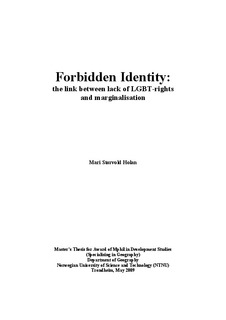Forbidden Identity:: the link between lack of LGBT-rights and marginalisation
Master thesis
Permanent lenke
http://hdl.handle.net/11250/265301Utgivelsesdato
2009Metadata
Vis full innførselSamlinger
- Institutt for geografi [1108]
Sammendrag
This thesis contributes to understanding the problematic aspect of heterosexual dominance in leading development discourse, most especially in relation to gender, sexuality and human rights. In order to embrace a full perspective of gender, an expansion of the rights-based approach to include sexual minorities is suggested.
Based on the lived experiences of lesbian, bisexual and transgender women in Kampala, Uganda, it is argued that human rights are constantly negotiated and interpreted to legitimize a social and legal exclusion of selected members of society. Qualitative methodology has been employed to investigate issues of health, participation, employment and personal safety. The voices of the marginalised are explored from a local context and show that discrimination of sexual minorities is institutionalised and difficult to combat as the present human rights framework refrains from directly including this group as right-holders.
The author argues that there is a strong relation between lack of sexual rights and marginalisation, where the latter occurs as a direct result of social and legal pervasive practises of discrimination in society, ranging from the government level to the nuclear family.
